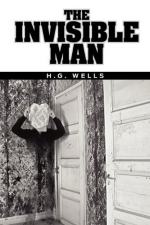“Thank you,” he said drily, glancing from her to the door and then at her again.
“I’ll have them nicely dried, sir, at once,” she said, and carried his clothes out of the room. She glanced at his white-swathed head and blue goggles again as she was going out of the door; but his napkin was still in front of his face. She shivered a little as she closed the door behind her, and her face was eloquent of her surprise and perplexity. “I never,” she whispered. “There!” She went quite softly to the kitchen, and was too preoccupied to ask Millie what she was messing about with now, when she got there.
The visitor sat and listened to her retreating feet. He glanced inquiringly at the window before he removed his serviette, and resumed his meal. He took a mouthful, glanced suspiciously at the window, took another mouthful, then rose and, taking the serviette in his hand, walked across the room and pulled the blind down to the top of the white muslin that obscured the lower panes. This left the room in a twilight. This done, he returned with an easier air to the table and his meal.
“The poor soul’s had an accident or an op’ration or somethin’,” said Mrs. Hall. “What a turn them bandages did give me, to be sure!”
She put on some more coal, unfolded the clothes-horse, and extended the traveller’s coat upon this. “And they goggles! Why, he looked more like a divin’ helmet than a human man!” She hung his muffler on a corner of the horse. “And holding that handkerchief over his mouth all the time. Talkin’ through it! ... Perhaps his mouth was hurt too—maybe.”
She turned round, as one who suddenly remembers. “Bless my soul alive!” she said, going off at a tangent; “ain’t you done them taters yet, Millie?”
When Mrs. Hall went to clear away the stranger’s lunch, her idea that his mouth must also have been cut or disfigured in the accident she supposed him to have suffered, was confirmed, for he was smoking a pipe, and all the time that she was in the room he never loosened the silk muffler he had wrapped round the lower part of his face to put the mouthpiece to his lips. Yet it was not forgetfulness, for she saw he glanced at it as it smouldered out. He sat in the corner with his back to the window-blind and spoke now, having eaten and drunk and being comfortably warmed through, with less aggressive brevity than before. The reflection of the fire lent a kind of red animation to his big spectacles they had lacked hitherto.
“I have some luggage,” he said, “at Bramblehurst station,” and he asked her how he could have it sent. He bowed his bandaged head quite politely in acknowledgment of her explanation. “To-morrow?” he said. “There is no speedier delivery?” and seemed quite disappointed when she answered, “No.” Was she quite sure? No man with a trap who would go over?
Mrs. Hall, nothing loath, answered his questions and developed a conversation. “It’s a steep road by the down, sir,” she said in answer to the question about a trap; and then, snatching at an opening, said, “It was there a carriage was upsettled, a year ago and more. A gentleman killed, besides his coachman. Accidents, sir, happen in a moment, don’t they?”




